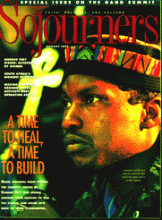As this is written we're surrounded by 1968. It seems to be the 25th anniversary of everything--from the assassinations and the riots to the White Album. From the Catonsville 9 to the Chicago Conspiracy, everyone is marking the silver anniversary of what was, in fact, the most overrated year of postwar American history.
I concede a lot did happen in 1968. The year was a maddening roller coaster of events, starting with the Vietnamese Tet offensive. At the time, Tet seemed like a turning point in a war that, in fact, ground on for seven more long, long years. The year staggered to a halt shortly after the November election of Richard Nixon, seemingly ensuring a permanent counter-revolution. But then the Trickster himself got his ticket cancelled early in his second term.
Events in Paris and Prague that year left a legacy of what might have been, if only....In Paris during that long-ago spring, students went on strike, as they were doing the world over. But things got serious when the students were joined by factory workers, who defied their own unions to demand a voice in a new self-managing, participatory democracy.
Meanwhile, in Czechoslovakia, Communist Party head Alexander Dubcek led a grand experiment in democracy, a full 17 years before glasnost. Dubcek aimed to build "socialism with a human face."
But the grand hopes of Paris and Prague couldn't survive the heat of summer. Those brief, tantalizing glimpses of a workable, grassroots, decentralized socialism vanished like the mist. In the blink of an eye the French ran back to De Gaulle and the Russian tanks took back Czechoslovakia.
The Democratic Convention in Chicago in August 1968 seemed like a big deal at the time, at least to my pubescent self watching on TV as the cops cracked skulls and the party bosses coronated Hubert Humphrey. But in reality the Chicago events meant little for the anti-war movement and less for the country.
Read the Full Article

